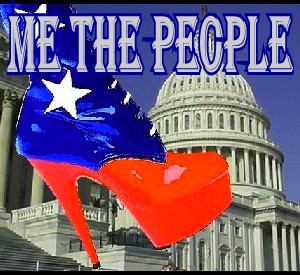 | ||||||

In Labor
They almost had me. Nona Polichick was almost seduced by Big Business last week.
I know, I know. It was a close call… I’m still shaking. But note I said ALMOST. (After all, I actually said it twice.)
Big Business boosters certainly do know how to market their bullshit. The spin geniuses who hawk the cause of rampantly growing, antitrust-violating multinational corporations started popping up like mushrooms during the Reagan era, when nearly a decade of economic stagnation had worn the country down to the point that trickle-down economics actually sounded like a viable option again. Nevermind that this mode of economic distribution had led to a disastrous economic depression fifty years earlier. Big companies, the boosters insisted, could provide more jobs and put more liquid cash back into the economy if they were given plenty of leeway to merge with other companies and create huge monopolies, offer low entry-level wages and fewer employee benefits, and enjoy very limited culpability for unfair hiring and labor practices. Older workers, who remembered all too well the leanest years of the Depression, were not sold. However, young people just entering the workforce, having no reference point by which to judge business practices, were eager to believe, especially when further deregulation of banks and S&Ls made it possible for new consumers with no credit history to obtain a charge card. They might have to put up with a crappy starting wage and no employee benefits like insurance or even paid time off, but they could continuously buy themselves treats with their very own no-interest credit cards.
But the spin doctors still had a problem – killjoys from the labor unions were making a lot of noise pissing and moaning to the media about layoffs of longtime employees in the auto and transport industries. Worse yet, they were mounting a very effective lobbying effort with the Democrat-controlled congress of the time to block Reagan’s suit-friendly economic initiatives. What to do? These assholes were leaving a big skidmark on the shiny new veneer of freewheeling, deregulated multinational corporations. Thus the glorious movement to discredit the labor unions was born.
It wasn’t exactly a hard sell. I mean, shit – if you were around in 1982 and somebody said “Teamsters”, your brain most likely offered up “Hoffa” in word association. The tacit understanding that labor leaders were not only shark-like lobbyists with half of Congress in their greasy pockets but in bed with the Mob was the expected angle that they pushed hard. (Never mind that at one point, the Labor movement had found its biggest champion in a progressive Republican President, Theodore “Trustbuster” Roosevelt; this was the new, improved “neoconservative” Republican party, who held no truck with slimy middlemen looking to take a bite out of the profit margin. Where Roosevelt had gone head-to-head over monopolies with JP Morgan, Reagan and crew now encouraged Congress to be receptive to the lobbying efforts of guys like Sam Walton.)
Another, more insidious insinuation was that they were dragging down business at the direct expense not only of the business owners and BODs themselves, but of the laborers themselves. The Auto Workers’ Union fell out of favor when it was implied that they’d fucked their own members by demanding too much money and too many benefits, driving up the cost of product to a point that nobody was buying American anymore. GM, squeezed by competition from Japanese auto companies that opened nonunion plants in the States, laid off Union workers in huge numbers. Teamster leaders were sent up for racketeering; politicians became leery of being associated with the union lobby. Eventually it came to a point where workers began to assume that they were better off pledging their loyalties to the companies they worked for; the unions became viewed as shady, opportunistic middlemen, simply more shysters looking for their cut.
The unions weren’t blameless in the smear campaign against them – they didn’t seem to have much trouble generating their own bad press. The air traffic controllers’ union went on strike against Reagan shortly after he assumed office; the new president’s uncompromising refusal to cave in to the union’s demands made him look tough and smart, while the striking workers themselves came off looking like selfish crybabies willing to bring international travel to a halt over a few frivolous benefits. The fact that their job was, and remains, among the most stressful and life-shortening to those who perform it, and the benefits they were asking for were what most high-level Federal employees in easier jobs were already enjoying, became secondary to this carefully crafted perception. All most people knew, or cared about, was being able to fly again, and Reagan gave them the impression that he, and he alone, made that happen. It worked, and Reagan’s approval rating soared while the ill perception of the unions deepened.
Today, while unions still exist, their heyday of power appears to be, for the most part, over. More businesses are being bought up by big multinationals that can afford to grudgingly offer employee benefits packages that are just adequate enough to keep more workers from unionizing, and employees understand that the watchword for the current workplace atmosphere is “at-will labor”. At-will labor, quite simply, means that once you set foot on your employer’s property and punch in, you are in a very real sense a wage slave; you have to do exactly what you are told and if you don’t like it, bear in mind that you can be fired at any time, for any reason, with no notice or turnaround period or explanation required. It’s a business-owners’ market.
It’s this atmosphere, compromised and corrupted, that led to the near-seduction I alluded to at the beginning of this piece.
I work at my daughter’s school, but I don’t work for the school district; I work for a contractor who pays me independently. I am, if you will, an at-will laborer; so is my husband and so are the majority of the people in my circle of friends who work for private companies, and nearly all of the other people I come into contact with. The only exceptions: the teachers I interact with on a daily basis. Teaching is the one profession around here still unionized almost down to the last individual, and the teachers at my school are on the verge of doing that most “union” of things – going on strike.
At issue is health care benefits. Teachers may be union members, but they work for the municipality, as do tax assessors and clerks, firefighters, police, and municipal maintenance crews. All of these other city workers I mention, though, have all of their health care benefits paid for by the city; the teachers don’t, they are expected to kick in a percentage of their own money or opt out of the insurance coverage entirely. Now, of course, as an at-will laborer, my first reaction upon hearing that teachers are about to strike, leaving not only my child but the children of every taxpayer in the city twisting in the wind (as well as compelling me to take an unwanted sabbatical from my own job), was, quite frankly, “Fuck them. Wouldn’t we ALL like to have free fucking health care. Wouldn’t we ALL like to be protected by some fucking union. Well, somebody needs to kick their asses. This is the REAL world we’re living in, and the businesses call the shots. Who do these people think they are?”
Quick show of hands. How many of you reading this agree with my initial reaction? Hang on, keep those hands up while I count.
Okay, put ‘em down. Just as I thought. You see where I’m headed with this? We’re a sorry bunch of sheep, aren’t we? We bought the Reaganomics-big business spin hook, line and sinker. Teddy Roosevelt should rise from his grave and slap the shit out of us for being such a bunch of sorry-assed lemmings.
See, kids, it’s time we remembered - it ain’t about the big corporations. It’s about US. THEY might have all the money and power, but only because WE gave it to them. We continue to make them stronger and richer every day, by going to work for them and making their crappy overpriced products, selling their substandard goods, or cleaning their executive toilets. The labor movement began in the first place because one small group of guys realized that if THEY didn’t do as their bullying boss man said and walked out, they might be out a crappy job, but it’d be Boss Man who’d truly be fucked. It might only be temporary, because there are always plenty of stooges out there looking for a job and desperate enough to do something despicable for money, but Boss Man would have to take the time to train these stooges, and without the help of those who’d done the actual work and knew the actual job, he couldn’t help them distinguish their ass from a hole in the ground. It wouldn’t mean jack shit if one guy did it, but if the whole lot of them banded together – yes, UNIONIZED – those who put in the sweat that got that shit done every day could at last achieve some parity with their chosen oppressors, and have a few guarantees of their own.
Fuck “at-will labor”. It’s time to reacquaint ourselves with the concept of “labor at will”.


